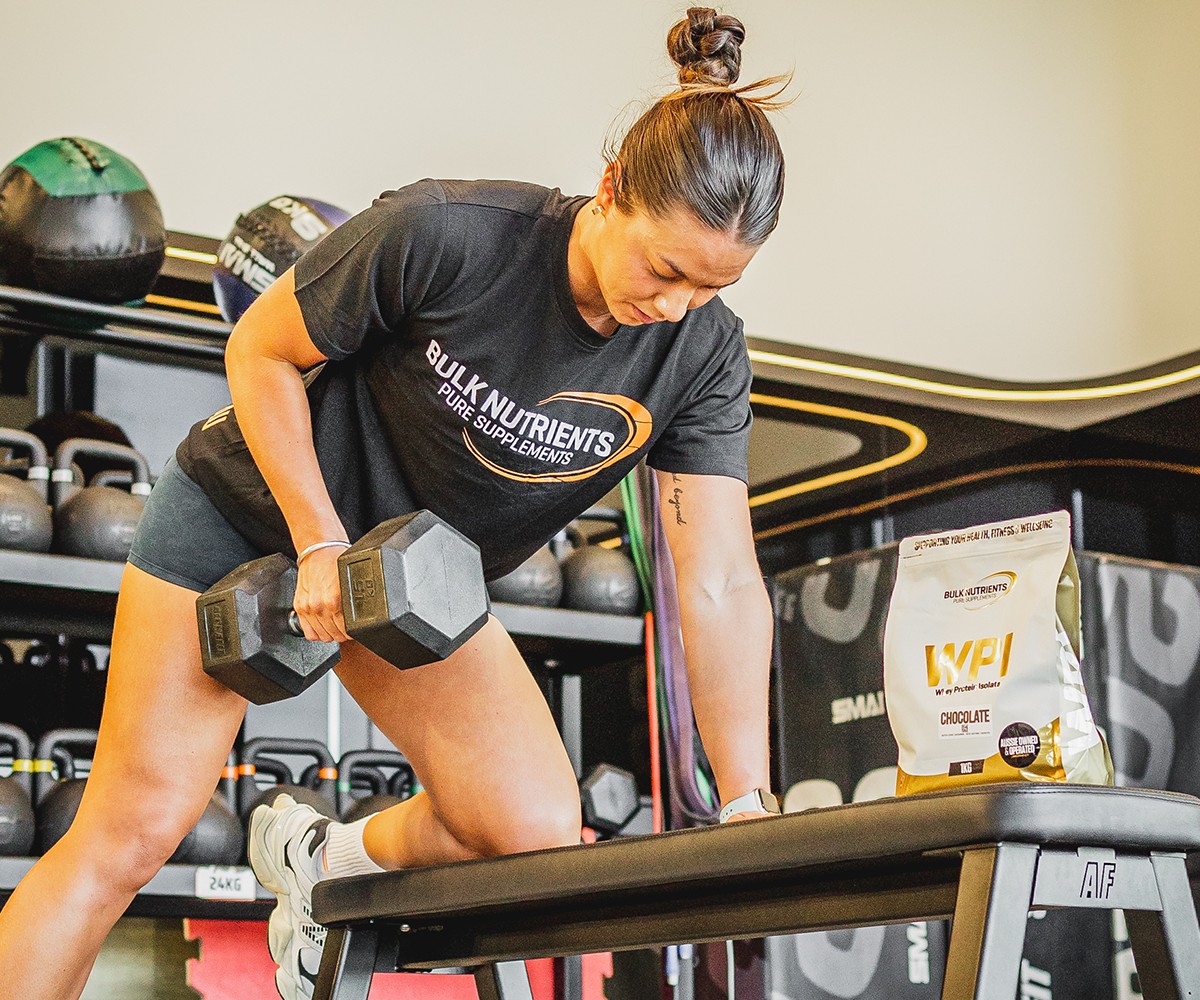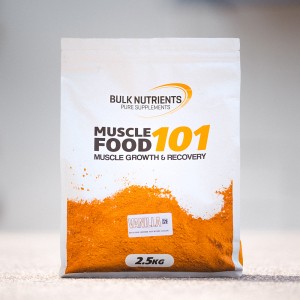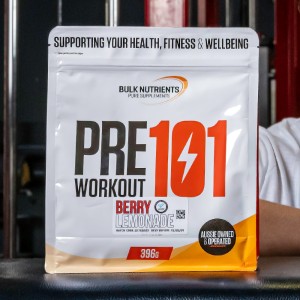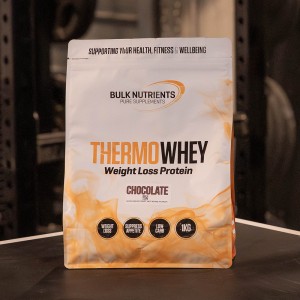Can We Still Grow Muscle When Dieting?

Can you build muscle in a calorie deficit?
One of the most common questions a lot of people ask when they’re starting a fitness journey is whether they can build muscle while reducing their calorie intake. Many people think you can either do one or the other – lose fat/lose weight, or gain muscle. The idea of both seems too good to be true.
But can you gain muscle in a calorie deficit? The answer isn’t a simple yes or a no… Depending on your experience level and your current body composition, your approach to muscle gain and fat loss will differ.
This study looks at whether it’s possible to gain muscle while in a calorie deficit, and how to best approach your fitness goals to get optimal results.
What happens to muscle growth when you’re dieting?
A calorie deficit occurs when you consume less calories than your body needs to maintain its current weight. It’s essential for fat loss, but what does it too if you’ve also got a goal of muscle growth?
One of the well documented downsides of training in a calorie deficit is that it hinders the production of insulin-like growth factor-1 (IGF-1). IGF-1 is a hormone that’s vital for muscle growth – studies have shown that even a short stint of three days in a calorie deficit can impair muscle growth response in resistance training. This is due to a reduction in the growth hormone, which is crucial for protein metabolism among other muscle building processes.
But does this mean that all hope is lost for those trying to build muscle while losing weight? Not necessarily.
But can you still build strength in a calorie deficit?
Interestingly while a calorie deficit can impair muscle growth, it doesn’t necessarily stop you from gaining strength. A recent review found that while those training in a calorie deficit saw impaired muscle growth, their strength gains weren’t affected. This suggests that strength gains aren’t solely dependent on muscle growth.
So, while building muscle on a calorie deficit may be more difficult, it’s still possible to increase your strength. This is a crucial distinction for individuals looking to lose fat and gain muscle at the same time.
How to lose fat and gain lean muscle
While gaining muscle on a calorie deficit is a challenge given what we’ve discussed above, it’s not impossible – especially for beginners or those who have a higher body fat percentage.
So can you lose weight and gain muscle at the same time? Surprisingly yes you can – particularly if you fall into one of the below categories:
Weightlifting beginners
If you’re new to lifting weights, your muscles are essentially untrained and will respond more quickly to resistance training. As a beginner, your body is able to lose fat and build muscle more efficiently, because it’s still adapting to the new stimulus that is resistance training.
Diet to lose fat and gain muscle if you’re overweight
If you’re holding a significant amount of body fat, your fat stores can provide the energy required for muscle growth even when you’re in a calorie deficit. The extra fat serves as a buffer, allowing you to gain muscle and eat fewer calories.
Lose weight and gain muscle on a high protein diet
Regardless of your gym or dieting experience, ensuring you consume enough protein is essential for building and preserving muscle, particularly when you’re in a calorie deficit. Research shows that consuming up to 3.1 grams of protein per kilogram of fat free body mass can help you maintain muscle while in a deficit – especially when combined with weight training.
What is the ideal calorie deficit for building muscle?
Now that we’ve discovered it is possible to build muscle during a calorie deficit (for some people), how big of a deficit is ideal? According to recent studies, the sweet spot to lose fat without sacrificing muscle is around 500 calories.
A bigger deficit like 800 or more calories significantly increases the risk of muscle loss, particularly for people who are more experienced lifters. That’s why it’s crucial to moderate the size of your deficit and ensure it’s not too aggressive.
For those who might be wondering, “should I lose weight before I gain muscle?”, the answer largely depends on your current body composition. If you’re someone who’s carrying a lot of excess fat, focussing on fat loss first while maintaining muscle through resistance training is a smart move – but on the other side of the spectrum, if you’re leaner and more experienced you’ll likely benefit from bulking in a slight surplus before focussing on fat loss.

Can upping my protein intake help me lose fat and gain muscle?
Protein is key to maintaining muscle, particularly in a calorie deficit. If you’re hoping to lose fat and gain lean muscle, having a close eye on your protein intake is going to be vital.
A diet high in protein helps muscle protein synthesis (the process that allows your muscles to grow) and helps prevent your muscles from breaking down during weight loss. Whether your goal is to lose weight and gain muscle or maintain muscle while losing fat, a protein-rich diet should be a non-negotiable. You should be aiming for at least 1.6-2.2 grams of protein per kilogram of body weight, depending on your activity level- some studies recommend 3.1 grams.
What is the best diet to lose fat and gain muscle?
As well as ensuring you’re getting enough protein (through foods like lean meats, fish, dairy, plant-based proteins like beans and lentils, or through supplements like protein powder), there are several other key areas to focus on when establishing the best diet to lose fat and gain muscle at the same time.
Carbohydrates
While many diets designed for weight loss advocate for low carbs, carbohydrates are important when it comes to performance and recovery, particularly when you’re trying to build muscle. Complex carbohydrates like sweet potatoes, brown rice and oats are a great option to fuel your workouts and help replenish glycogen stores.
Healthy fats
Fats are essential when it comes to hormone regulation, so it’s important to look after the hormones responsible for muscle growth and fat loss. Look at adding healthy fat sources like avocados, nuts, seeds, olive oil and fatty fish into your diet to help with a balanced approach.
Pairing this with a protein rich diet and a calorie deficit of around 500 calories per day will help you lose fat while preserving muscle. Add in regular weight training and you’re on to a winning combination!

Sooo… What’s the best way to lose weight and gain muscle?
In case you haven’t gathered – yes, it can be possible to gain muscle in a calorie deficit! For beginners and those carrying extra body fat, you can lose fat and gain muscle at the same time. For people who are leaner or more advanced lifters it’s harder to gain muscle in a calorie deficit – but strength gains can still be seen.
The key takeaway is to approach your goals with a strategy that matches your current fitness level. If you’re new to lifting, focus on a diet rich in protein while maintaining a moderate calorie deficit, and you can expect to see both fat loss and muscle gain. If you’re more experienced, consider cycling between periods of muscle building and fat loss, depending on your overall goals.
If you fall into the second category, there’s still good news – research does suggest you can still gain strength while dieting. If you keep your deficit at 500 calories and keep lifting weights when dieting, you can preserve your hard-earned muscle.
No matter your experience level, the most important thing is consistency in your training and diet. With the right approach, you can successfully navigate the tricky waters of losing fat and gaining muscle at the same time.
References:
- Clemmons DR. Metabolic actions of insulin-like growth factor-I in normal physiology and diabetes. Endocrinol Metab Clin North Am. 2012;41(2):425-443. https://www.sciencedirect.com/science/article/abs/pii/S0889852912000394
- Donnelly JE, Sharp T, Houmard J, Carlson MG, Hill JO, Whatley JE, Israel RG. Muscle hypertrophy with large-scale weight loss and resistance training. Am J Clin Nutr. 1993 Oct;58(4):561-5. doi: 10.1093/ajcn/58.4.561. PMID: 8379514.
- Ecl.2012.04.017
- Folland JP, Williams AG. The adaptations to strength training : morphological and neurological contributions to increased strength. Sports Med. 2007;37(2):145-168. https://link.springer.com/article/10.2165/00007256-200737020-00004
- Garthe I, Raastad T, Refsnes PE, Koivisto A, Sundgot-Borgen J. Effect of two different weight-loss rates on body composition and strength and power-related performance in elite athletes. Int J Sport NutrExercMetab. 2011 Apr;21(2):97-104. doi: 10.1123/ijsnem.21.2.97. PMID: 21558571.
- Helms ER, Zinn C, Rowlands DS, Brown SR. A systematic review of dietary protein during caloric restriction in resistance trained lean athletes: a case for higher intakes. Int J Sport NutrExercMetab. 2014 Apr;24(2):127-38. doi: 10.1123/ijsnem.2013-0054. Epub 2013 Oct 2. PMID: 24092765.
- Moller N, Jorgensen JO. Effects of growth hormone on glucose,lipid, and protein metabolism in human subjects. Endocr Rev. 2009;30(2):152-177. https://doi.org/10.1210/er.2008-0027
- Murphy C, Koehler K. Caloric restriction induces anabolic resistance to resistance exercise. Eur J Appl Physiol. 2020;120(5):1155-1164. https://link.springer.com/article/10.1007/s00421-020-04354-0
- Murphy C, Koehler K. Energy deficiency impairs resistance training gains in lean mass but not strength: A meta-analysis and meta-regression. Scand J Med Sci Sports. 2022 Jan;32(1):125-137. doi: 10.1111/sms.14075. Epub 2021 Oct 13. PMID: 34623696.
Related Blogs

How Effective Are Diet Apps for Weight Loss?
Posted by Bulk Nutrients
Estimated reading time: 6 minutes

The Two Things Every Weight Loss Diet Has in Common
Posted by Bulk Nutrients
Estimated reading time: 6 minutes

Practical Dieting for Sustainable Fat Loss Success
Posted by Bulk Nutrients
Estimated reading time: 18 minutes

















































